How Old England Trains Her Red Coats
Journal of Manly Arts
April 2003
by Charles Turner
Originally published in Outing magazine, March 1891, No. 6, p. 412-418.
VERY few foreigners, certainly not many Americans, are likely to be long in London before they wend their way into Parliament street, and few therefore can be without at least a superficial acquaintance with those outward and visible signs of the British army, 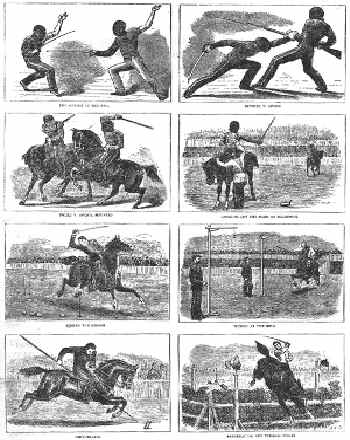 the flanking sentinels of the Horse Guards, as illustrated in our frontispiece. Tall beyond the ordinary run of men, mounted on high-mettled, glossy black chargers, dressed to perfection, in their white leather breeches, their superlatively high top boots, their spotless gauntlets, their burnished steel cuirasses and their metal helmets, reflecting the nodding plume, they are the never-ending admiration of all small boys, the cynosure of all the nursemaids' eyes from Norwood to Kew, and of more than passing interest to all strangers.
the flanking sentinels of the Horse Guards, as illustrated in our frontispiece. Tall beyond the ordinary run of men, mounted on high-mettled, glossy black chargers, dressed to perfection, in their white leather breeches, their superlatively high top boots, their spotless gauntlets, their burnished steel cuirasses and their metal helmets, reflecting the nodding plume, they are the never-ending admiration of all small boys, the cynosure of all the nursemaids' eyes from Norwood to Kew, and of more than passing interest to all strangers.
To those who see them thus they seem, at first blush, immovable and passive; they show no sign of life and, except for the champing bits of their steeds, they give rather the impression of trophies than of living equestrians; indeed, it is only when you turn from the mounted sentinels outside to those in the court yard and note the giants there on foot, similarly accoutred, with carbine on arm, striding the flagstones with mathematical precision, that you are quite sure they are alive. Every inch soldiers, with the carriage of conscious power, these aristocrats of the British army have not escaped the shrewish tongue of envy and it has been, at recurring periods, a fashionable form of raillery to call them "Knights of the Carpet; " but when these men have been put to the test of active service they have dispelled this illusion, and those who read of them at Waterloo or Inkerman, or who saw them on the sands of Egypt, so recently as Tel-el-Kebir, read or saw feats of arms such as none but the most perfectly disciplined and expert horsemen in the world could have executed. But there is no need to see them on the tented field; a second's inspection will satisfy you that beneath the grave exterior and the glitter and pomp of the full dress in which they discharge their home duties there lie a power and a skill such as are given to only the most perfect development of inherent abilities and of the human frame.
Nor is this at all surprising when one comes to give a more than momentary consideration to the British army and its functions. How otherwise could it, comparatively small as it is, be relied on to discharge its manifold duties in all parts of the world? If every unit in it were not brought to the highest state of physical perfection and military expertness, how could it possibly withstand the strain which climate and service over a dominion on which the sun never sets imposes upon it? It has to form the nucleus, and by its own efficiency inspire the respect of the swarthy thousands, far outnumbering itself, of the native army of India, and to awe into submission the millions of civilians there ready, as the mutiny proved, to rend the hand that keeps them from rending each other and from returning to that chaos of infuriated bigotry and bloodshed from which nothing but the might of England saved them. It has to keep in check the predatory instincts and lawless impulses of antagonistic populations in South Africa, which, if let loose, would there trample out the rights of the black man with a ruthless disregard of all that the more civilized and equity-loving people of Europe regard as justice. It has to protect the fellaheen of Egypt on the one hand against the slave-catching Arab of the far Soudan, and on the other hand against the foreign harpies and unprincipled tyrants who are ready to fatten on their miseries at home. It has to follow the fierce sons of the hills in Upper 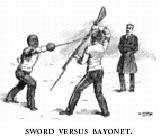 India into their fastnesses, and to drag the piratical dacoit of Burmah from his lurking places, that the peacefully disposed may follow their callings and enrich the world with their industry. It has to garrison the great chain of fortresses, set like a girdle on the great highway to the East, from Gibraltar to Aden; and it has to meet the continued drain, yearly more and more increasing, of time-expired men whose places must be filled in every garrison over the wide world. Nor is this all; mere numbers might do that, but when war comes, as in the discharge of these police duties come it will, it has to fight in necessarily small numbers, and against great odds, the most skilled, fanatical and infuriated savages in the world; swordsmen whose skill is the unbroken tradition of a thousand years; men who, like the hill tribesmen of India, will not hesitate, naked and armed only with a knife, to face the tiger in the fenced arena, and will vanquish this mighty lord of the forest; Arabs, fleet children of the desert, whose scimitars carried terror through the greater part of Europe and established a kingdom, reaching from the Bay of Biscay to the Euxine, which three hundred years of battering has failed wholly to demolish; Maoris in New Zealand, who could never be dislodged from their stockaded forts, except at close quarters. All these duties and many like these have fallen year by year on the rank and file of the British army. Now, such duties are not fulfilled by merely providing, as the great armies of France, Germany and other Continental countries mainly do, an immense mass of food for modern artillery to shatter into fragments at distances which must be reckoned by miles; they require a physical ability and trained use in the primitive weapons of the world, the sword and the lance, such as is not called into requirement by the great manæuvring millions who play the game of war in the so-called civilized countries of Europe, where, given the data, the moves, like those at chess, can be forecast and cannot be deviated from. The British soldier has mainly to meet his enemy at the gate single handed, face to face, and to grapple with him there in personal conflict, as fierce and dependent as much on personal skill and endurance, as did the knights of old who met the ancestors of his to-days enemies in the Crusades. Hence it follows that the training of the British soldier, to be successful, must be physical, painstaking and skillful.
India into their fastnesses, and to drag the piratical dacoit of Burmah from his lurking places, that the peacefully disposed may follow their callings and enrich the world with their industry. It has to garrison the great chain of fortresses, set like a girdle on the great highway to the East, from Gibraltar to Aden; and it has to meet the continued drain, yearly more and more increasing, of time-expired men whose places must be filled in every garrison over the wide world. Nor is this all; mere numbers might do that, but when war comes, as in the discharge of these police duties come it will, it has to fight in necessarily small numbers, and against great odds, the most skilled, fanatical and infuriated savages in the world; swordsmen whose skill is the unbroken tradition of a thousand years; men who, like the hill tribesmen of India, will not hesitate, naked and armed only with a knife, to face the tiger in the fenced arena, and will vanquish this mighty lord of the forest; Arabs, fleet children of the desert, whose scimitars carried terror through the greater part of Europe and established a kingdom, reaching from the Bay of Biscay to the Euxine, which three hundred years of battering has failed wholly to demolish; Maoris in New Zealand, who could never be dislodged from their stockaded forts, except at close quarters. All these duties and many like these have fallen year by year on the rank and file of the British army. Now, such duties are not fulfilled by merely providing, as the great armies of France, Germany and other Continental countries mainly do, an immense mass of food for modern artillery to shatter into fragments at distances which must be reckoned by miles; they require a physical ability and trained use in the primitive weapons of the world, the sword and the lance, such as is not called into requirement by the great manæuvring millions who play the game of war in the so-called civilized countries of Europe, where, given the data, the moves, like those at chess, can be forecast and cannot be deviated from. The British soldier has mainly to meet his enemy at the gate single handed, face to face, and to grapple with him there in personal conflict, as fierce and dependent as much on personal skill and endurance, as did the knights of old who met the ancestors of his to-days enemies in the Crusades. Hence it follows that the training of the British soldier, to be successful, must be physical, painstaking and skillful.
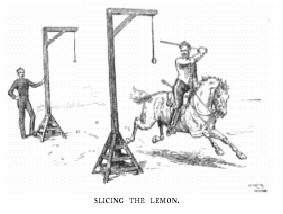 Nor is this view of him and his duties lost sight of by those having him in charge. He is not prepared in the "armory," like the volunteers in Great Britain, or the national guardsmen in the States, to march, to countermarch, to move in companies with precision, and after a few days' battalion drill in camp ticketed "efficient." He has to be treated as an individual unit and every ounce of strength and atom of skill he has in him has to be developed to the highest point which care, system, long knowledge of the art and experienced teachers can bring out of him. It follows, therefore, that at the base of the British soldier's career lies not so much the "drill sergeant" as the "gymnast;" not so much he who perfects him in the goose step as the riding master and the fencing instructor. And so it is that, when the recruiting officer has once got hold of the raw recruit, the mere frame of bone and muscle fresh from the plough tail, often overgrown and oftener underfed for his years and strength, the first routine is, out of that material, to knit together the man; to loose the stiffened joints, to make supple the brawny shoulders which nature has provided, to strengthen the long legs, to set up the back bones, to turn his muscles into iron and his sinews into whip cord.
Nor is this view of him and his duties lost sight of by those having him in charge. He is not prepared in the "armory," like the volunteers in Great Britain, or the national guardsmen in the States, to march, to countermarch, to move in companies with precision, and after a few days' battalion drill in camp ticketed "efficient." He has to be treated as an individual unit and every ounce of strength and atom of skill he has in him has to be developed to the highest point which care, system, long knowledge of the art and experienced teachers can bring out of him. It follows, therefore, that at the base of the British soldier's career lies not so much the "drill sergeant" as the "gymnast;" not so much he who perfects him in the goose step as the riding master and the fencing instructor. And so it is that, when the recruiting officer has once got hold of the raw recruit, the mere frame of bone and muscle fresh from the plough tail, often overgrown and oftener underfed for his years and strength, the first routine is, out of that material, to knit together the man; to loose the stiffened joints, to make supple the brawny shoulders which nature has provided, to strengthen the long legs, to set up the back bones, to turn his muscles into iron and his sinews into whip cord.
For this purpose the recruit is handed over to the precincts of the gymnasium, where, for the first three months, he almost lives. When all this is over, and it is done in that time or sufficiently forwarded for further progress to be assured, his own father would scarcely know him. No longer the ungainly slouch which his occupation had tended to produce and habit had confirmed, but straight as an arrow, quick eyed as a hawk, limber as a serpent and strong as a son of Anak, he is ready for the riding school and the swordsman two ordeals as painful and painstaking, in their several departments, as the gymnast's, and crowned in the majority of cases with a success as signal, as we shall presently see.
For many years such had been the method of building up the British soldier; but as all things in the modern world exact dispatch it became necessary to expedite and facilitate the making of the perfected soldier; and there arose with the adoption of the short-service system another question: "How is the soldier at home to be inspired with an incentive strong enough to develop very early in his military career, and to keep alive beyond the stage when he was delivered over by his teachers as efficient, that continuous practice which is absolutely necessary to maintain efficiency how to make work, in fact, not only a duty but a pleasure?"
Serious as the problem was it has been solved for good and aye. The military tournaments which culminate in the metropolis every year, to delight ever increasing thousands upon thousands of civilians and soldiers, who flock to them from every corner of the United Kingdom, are the factors solving it. And yet, curiously enough, while many were anxiously groping for this answer it came, as it were, of itself in one of those far-off, mysterious ways which it is as impossible to fathom as to explain. This great motive force was entirely the result of all accident indeed was the outcome of a disaster.
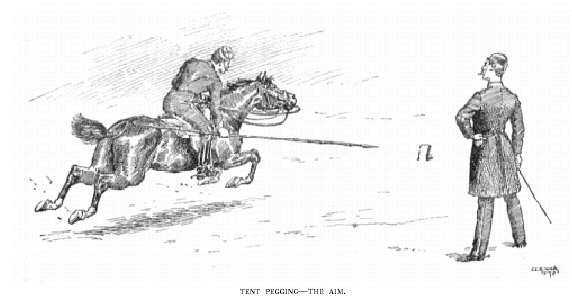 All the world remembers the calamity which fell on an isolated portion of the British army in 1878, at Isandlana and Rorke's Drift, when, exposed to the deadly ambush of the Boers, its ranks were swept by the murderous fire of the most skillful shooters of an eminently shooting country.
All the world remembers the calamity which fell on an isolated portion of the British army in 1878, at Isandlana and Rorke's Drift, when, exposed to the deadly ambush of the Boers, its ranks were swept by the murderous fire of the most skillful shooters of an eminently shooting country.
Out of the graves of the heroes who fell there arose the quickening phoenix of the competitions which all judges admit have had, are having and will continue to have a far-reaching and important effect upon the morale and, what is of more consequence, upon the esprit de corps of the British army. For it entered into the head of I know not whom (except it were poor Major General Burnaby, who sacrificed his life so foolish gallantly at Tel-el- Kebir) that it would be a patriotic thing to utilize the staff of the Aldershot Gymnasium to give an entertainment, in the Albert Hall, London, on behalf of a fund for the relief of the widows and orphans of the soldiers who fell in those two sanguinary and never-to-be-forgotten engagements. The patriotism of the country, and the gratitude due to the fallen heroes, provided an ample monetary reward, and in that manner was started on its way the great wave which, in its subsequent movement, has extended so widely and markedly raised the standard of excellence in every individual of which the army consists.
Necessarily, indeed from the very place in which the display was held, it had, compared with later developments, a very limited function, was in fact but a somewhat extended exhibition of the already more or less familiar in provincial towns "assaults of arms," whereat feats of skill and strength with the sword had been shown by the fencing masters of the army for many years; but the movement once concentrated in the metropolis, limited to masters in their respective lines, and extended so as to include other and more varied forms of skill and daring, was no sooner seen than it was keenly appreciated by the public, and when to it was added horsemanship, as was soon after done at West Drayton by Windsor, the public set the seal of its approval and its permanent and ultimate success was assured.
In the next year this seed sown by the way took root at the Agricultural Hall, Islington, in the form of a fully-organized display and competition of military training and exercise between all the branches. Cavalry and infantry, artillery and musketry, engineers and ambulance corps, 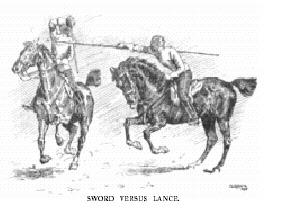 sword and lance, sabre and bayonet, horsemanship and agility on foot, feats of skill and feats of strength, all for the first time came together in a competition which has not only provided a rallying point and incentive to the soldier, and a social function the most popular of the whole year, but has added over a million dollars to the funds of the various military charities providing for the widows and orphans of the British soldier.
sword and lance, sabre and bayonet, horsemanship and agility on foot, feats of skill and feats of strength, all for the first time came together in a competition which has not only provided a rallying point and incentive to the soldier, and a social function the most popular of the whole year, but has added over a million dollars to the funds of the various military charities providing for the widows and orphans of the British soldier.
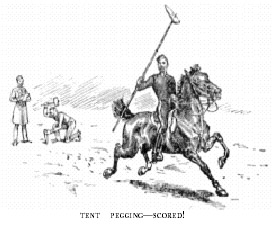 Graced from the first by the presence of all that is notable in society and brilliant in itself beyond expectation, these sports broke like a revelation upon the public, with whom such prowess and evidence of equestrian skill had always been popular, even when they took the form only of the strolling circus, and they became much more so when displayed with all the pomp and circumstance of warlike troops, in numbers and variety never before gathered together, and executed by each man under the spurring influence of publicity and competition. Agricultural Hall became the Old Tilting Yard, and its contests were instinctively christened "The Tournaments." All ranks of the service, officers and men; all branches of its forces, regulars, and yeomanry, volunteers and militia, alike vied with each other in a desire to join in these contests and in preparations to acquit themselves in one or other of the departments to which their particular service lent itself.
Graced from the first by the presence of all that is notable in society and brilliant in itself beyond expectation, these sports broke like a revelation upon the public, with whom such prowess and evidence of equestrian skill had always been popular, even when they took the form only of the strolling circus, and they became much more so when displayed with all the pomp and circumstance of warlike troops, in numbers and variety never before gathered together, and executed by each man under the spurring influence of publicity and competition. Agricultural Hall became the Old Tilting Yard, and its contests were instinctively christened "The Tournaments." All ranks of the service, officers and men; all branches of its forces, regulars, and yeomanry, volunteers and militia, alike vied with each other in a desire to join in these contests and in preparations to acquit themselves in one or other of the departments to which their particular service lent itself.
To such an extent, indeed, did this desire extend that it soon became necessary to impose the restriction of the passage through, and the obtainment of the first place in merit from, a district tournament at Aldershot, Woolwich, Portsmouth or Dublin as a condition precedent to competition in London; and, to add to the inducement to achieve the ability necessary for success, it became possible in many of the events to pit, in this mimic warfare, one service against another cavalry of the line against yeomanry, cavalry and regular infantry against the militia and the volunteers.
That all branches of the service have been signally benefited by these annual tournaments and by the long and patient preparations for them, is amply evidenced by the ever-increasing standard of excellence which year by year has seen develop. It is not possible within the limited scope of even so large a floor space as the Agricultural Hall to display all, or nearly all, the evolutions which the cavalry and artillery respectively are trained to perform in the field, and thereby much of the highest expertness and skill attained in those arms can still only be witnessed by a visit to Woolwich Common or Aldershot Camp. The exercises which are given may be roughly divided into two classes: Those which come within the ordinary routine of the soldier's duty such, for instance, as the bayonet and sword practice-and those which are imported from his amusements, such as the "tent pegging;" and they may furthermore be more or less again divided into two classes those which appeal to the eye as spectacles and those which exhibit the expertness, strength or skill of the individual.
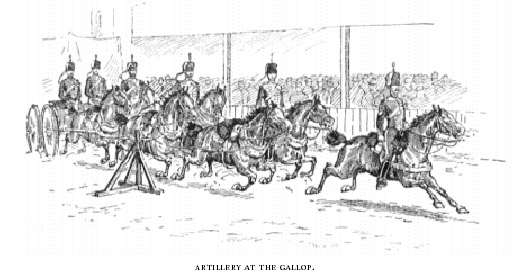 As a spectacle, undoubtedly the most pleasing is that produced by the "musical ride," which mainly falls to the Household Cavalry. Indeed, as an exhibition of docility and intelligence on the part of the horse and patience on the part of the men, who train them for the effect as a labor of love and not of duty, it would be difficult to design a more pleasing, or instructive or picturesquely striking feature. The faultless seat and get up of the men; the spirit which is manifest in every step of the horse and every flash of his eye; the evident degree to which they are under the influence of time and symphony in the music; the quality and perfection of the music itself; the mingling maze of flashing steel and glinting color which the uniforms give as they wind in and out the dance or swerve rigid and faultless as the spokes of a wheel round its hub; the schapokas of the lancers, with their flying horsehair plumes, their bright scarlet in the world to be remarkable, and plastrons, their fluttering pennons of red and white; the golden helmets and the silvered cuirasses of the Guards; the precision of movement and magnificent physique, could not fail in any assembly in one as sympathetic as is gathered in London it is not surprising, or beyond the merits of justice, to pronounce them admirable.
As a spectacle, undoubtedly the most pleasing is that produced by the "musical ride," which mainly falls to the Household Cavalry. Indeed, as an exhibition of docility and intelligence on the part of the horse and patience on the part of the men, who train them for the effect as a labor of love and not of duty, it would be difficult to design a more pleasing, or instructive or picturesquely striking feature. The faultless seat and get up of the men; the spirit which is manifest in every step of the horse and every flash of his eye; the evident degree to which they are under the influence of time and symphony in the music; the quality and perfection of the music itself; the mingling maze of flashing steel and glinting color which the uniforms give as they wind in and out the dance or swerve rigid and faultless as the spokes of a wheel round its hub; the schapokas of the lancers, with their flying horsehair plumes, their bright scarlet in the world to be remarkable, and plastrons, their fluttering pennons of red and white; the golden helmets and the silvered cuirasses of the Guards; the precision of movement and magnificent physique, could not fail in any assembly in one as sympathetic as is gathered in London it is not surprising, or beyond the merits of justice, to pronounce them admirable.
Next to the ride in picturesqueness, though before it as an exhibition of skill in management and capacity on the horse's part to perform exact movements, is that which comes out in the competitions of the Royal Artillery, of which we give illustrations, consisting of teams trotting and galloping their guns through various evolutions. This competition differs from the musical ride in one important point it is a duty drill; but it is like it in another, in that each of the team rides the same horse he has trained and each man works with the other men with whom he has been in the habit of acting. It consists in each team of six horses, with their gun, driving at a trot round the circle of the hall between twelve sets of round blocks, about a foot high, laid on the ground only just so far apart as that there is altogether three inches more space between them than there is in the external diameter of the wheels of the gun carriage, and, subsequently to gallop, full speed, round the same space, with sets of three feet high gate posts set so that there is six inches more diameter between them than there is between the wheels of the gun carriage. A feat the nicety of which can be best estimated by remembering that each team consists of three pairs of horses, linked on to each other by ropes only; that each pair is ridden and led by a different man; that the gun carriage is perfectly rigid, without spring or joint, and that the gun is attached to it by a peg and pivot at the back, round which the gun can revolve, or swerve, to any angle which awkwardness or accident permit it, and that the slightest touch would topple over the wooden cones which mark the trotting course, or displace the angle of the posts which mark the gallop.
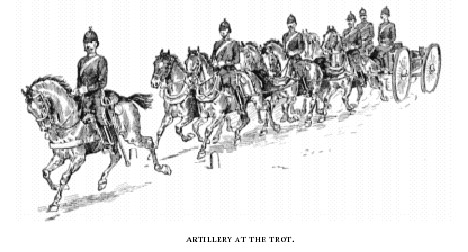 Of the other sports, not strictly drill, perhaps the next most popular, which we illustrate, is the tent pegging, a pastime which is most frequently indulged in by the troops, both native and regular, of India, from whence it was brought some few years ago by the Seventh Hussars and from whom it has spread through all the cavalry of the line. It is not an easy performance; it requires a firm seat, a quick eye and an iron wrist to effect it successfully. When so accomplished it is a very pretty feat of arms, and, withal, a very useful one too, for the man who can lift a tent peg, without fail, has gone as far in the use of the deadly lance as any enemy he is likely to meet in actual war. The peg is an ordinary wooden tent peg, three inches broad and a foot long, driven nearly perpendicularly into the ground until little less than half of it remains in sight. At this object, lance in hand, the trooper rides full tilt, strikes it on the gallop, and without one moment relaxing the grasp of his lance or the speed of his horse, he has, to be successful, to wrench it out of the ground and carry it away. Now, seeing that the lance arm will, in the twinkling of an eye after striking, he on the hither side of the stricken peg, it will be seen that the tent peg is a test of no mean nature, and yet, especially in regiments recently returned from India, trooper after trooper will succeed every time.
Of the other sports, not strictly drill, perhaps the next most popular, which we illustrate, is the tent pegging, a pastime which is most frequently indulged in by the troops, both native and regular, of India, from whence it was brought some few years ago by the Seventh Hussars and from whom it has spread through all the cavalry of the line. It is not an easy performance; it requires a firm seat, a quick eye and an iron wrist to effect it successfully. When so accomplished it is a very pretty feat of arms, and, withal, a very useful one too, for the man who can lift a tent peg, without fail, has gone as far in the use of the deadly lance as any enemy he is likely to meet in actual war. The peg is an ordinary wooden tent peg, three inches broad and a foot long, driven nearly perpendicularly into the ground until little less than half of it remains in sight. At this object, lance in hand, the trooper rides full tilt, strikes it on the gallop, and without one moment relaxing the grasp of his lance or the speed of his horse, he has, to be successful, to wrench it out of the ground and carry it away. Now, seeing that the lance arm will, in the twinkling of an eye after striking, he on the hither side of the stricken peg, it will be seen that the tent peg is a test of no mean nature, and yet, especially in regiments recently returned from India, trooper after trooper will succeed every time.
Of prowess with the sword and with the bayonet there is a full plenty, and many and close are the desperate bouts which the fortnight's tournament produces. Every possible combination which the soldier in actual warfare is likely to have to face seems to come within the scope of his drill. The unmounted infantryman whose magazine is emptied is swooped down upon by a cavalryman armed with the sword, and each rushes at the other as if dear life depended on it, or maneuvre for position as if a slip would not only end the chance of glory but their days. It looks indeed it is quite real, and the spirit of it is so much so that when the bayonet pierces, or seems to pierce, the cavalryman under the arm and glides apparently six inches into him, one almost expects to see the blood follow its withdrawal. It is only when we are confidently informed that the bayonet is set on a spring and retires down the barrel, instead of entering the man's side, that apprehension is wholly removed; but this arrangement and the round-edged Wilkinson's practicing sword are safeguards against any serious accident. Nor does the fight end here, for even when the horse is ruled out, disabled, and the cavalryman is reduced to his sword, he still fights, like the Corsican brothers, until every form of arm is exhausted. Up rises the fallen foeman and on come again the clang of arms and the struggle for the mastery.
When the foot soldier, armed with gun and bayonet only, meets the horse soldier, armed with the sword, it will go hard with the horseman if he be not of the nimblest and cleverest; but when the horseman comes down, like a wolf on the fold, with lance at poise, it needs must be a swordsman of high excellence, great judgment, keen eye and splendid agility who can avoid its deadly point.
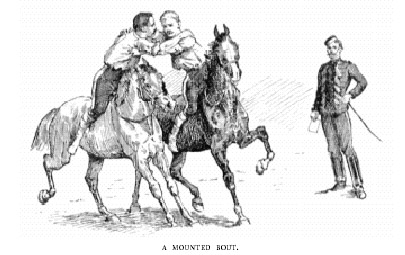 Of the theoretical drill, if it may be so called i.e., the drill which is directed to developing accuracy and quickness without the interposition of a living enemy there are long and varied competitions, of which that known as "heads and posts" may be taken as a type. In this competition the horseman has to traverse a distance of about a hundred yards, during which he has to gain his impetus, execute ten distinct evolutions with the sword, three on one side of his horse and three on the other, jump a flight of hurdles and come to a dead stop; and he has to do each of these in the orthodox regulation way, and in no other. Every muscle in the body and every bone in the hand and arm must be just where theory says it will be most effective, and in no other place. It is this which gives the competition and the antecedent drill their disciplinary value.
Of the theoretical drill, if it may be so called i.e., the drill which is directed to developing accuracy and quickness without the interposition of a living enemy there are long and varied competitions, of which that known as "heads and posts" may be taken as a type. In this competition the horseman has to traverse a distance of about a hundred yards, during which he has to gain his impetus, execute ten distinct evolutions with the sword, three on one side of his horse and three on the other, jump a flight of hurdles and come to a dead stop; and he has to do each of these in the orthodox regulation way, and in no other. Every muscle in the body and every bone in the hand and arm must be just where theory says it will be most effective, and in no other place. It is this which gives the competition and the antecedent drill their disciplinary value.
The first evolution, at the end of the first fifteen yards, is a forward cut on the right of the horse which must sever the neck of a dummy head level, like a supposed foeman, with the cavalryman's arm and lay it rolling in the dust. The next at fifteen yards, on the left of the horseman is a thrust at a supposed foe, and in proof of the accuracy of the aim the horseman must remove a ring on his sword point. The third is a back-handed cut which must bring down another head, supposed just to have ridden by. Then comes the hurdle, and on landing, almost at its foot, is another thrust. The fifth is a low cut at infantry on the opposite side, quick as lightning, and the final a thrust at infantry represented by a ball on the left side very low. Seeing that the whole of these operations must be performed with regulation accuracy, their rapid and perfect accomplishment marks a swordsman of ingenuity and nice finish, whom the transfer to actual warfare would find ready.
Of the score of other events in which these sons of Mars meet it is not necessary to speak in detail, nor is it the object to do so. If this description should succeed in directing attention to the practical results which arise from, and can only be effected by, a closer regard to systematic physical development as the base of the efficient soldier's training; if it should succeed in setting out the special necessity of individual skill on the part of every separate soldier, and if it portrays successfully the beneficial effects of a due admixture of serious "work" in the preparation, and "play" in the competitive exhibition, it will have effected all its author aimed at.
 the flanking sentinels of the Horse Guards, as illustrated in our frontispiece. Tall beyond the ordinary run of men, mounted on high-mettled, glossy black chargers, dressed to perfection, in their white leather breeches, their superlatively high top boots, their spotless gauntlets, their burnished steel cuirasses and their metal helmets, reflecting the nodding plume, they are the never-ending admiration of all small boys, the cynosure of all the nursemaids' eyes from Norwood to Kew, and of more than passing interest to all strangers.
the flanking sentinels of the Horse Guards, as illustrated in our frontispiece. Tall beyond the ordinary run of men, mounted on high-mettled, glossy black chargers, dressed to perfection, in their white leather breeches, their superlatively high top boots, their spotless gauntlets, their burnished steel cuirasses and their metal helmets, reflecting the nodding plume, they are the never-ending admiration of all small boys, the cynosure of all the nursemaids' eyes from Norwood to Kew, and of more than passing interest to all strangers. India into their fastnesses, and to drag the piratical dacoit of Burmah from his lurking places, that the peacefully disposed may follow their callings and enrich the world with their industry. It has to garrison the great chain of fortresses, set like a girdle on the great highway to the East, from Gibraltar to Aden; and it has to meet the continued drain, yearly more and more increasing, of time-expired men whose places must be filled in every garrison over the wide world. Nor is this all; mere numbers might do that, but when war comes, as in the discharge of these police duties come it will, it has to fight in necessarily small numbers, and against great odds, the most skilled, fanatical and infuriated savages in the world; swordsmen whose skill is the unbroken tradition of a thousand years; men who, like the hill tribesmen of India, will not hesitate, naked and armed only with a knife, to face the tiger in the fenced arena, and will vanquish this mighty lord of the forest; Arabs, fleet children of the desert, whose scimitars carried terror through the greater part of Europe and established a kingdom, reaching from the Bay of Biscay to the Euxine, which three hundred years of battering has failed wholly to demolish; Maoris in New Zealand, who could never be dislodged from their stockaded forts, except at close quarters. All these duties and many like these have fallen year by year on the rank and file of the British army. Now, such duties are not fulfilled by merely providing, as the great armies of France, Germany and other Continental countries mainly do, an immense mass of food for modern artillery to shatter into fragments at distances which must be reckoned by miles; they require a physical ability and trained use in the primitive weapons of the world, the sword and the lance, such as is not called into requirement by the great manæuvring millions who play the game of war in the so-called civilized countries of Europe, where, given the data, the moves, like those at chess, can be forecast and cannot be deviated from. The British soldier has mainly to meet his enemy at the gate single handed, face to face, and to grapple with him there in personal conflict, as fierce and dependent as much on personal skill and endurance, as did the knights of old who met the ancestors of his to-days enemies in the Crusades. Hence it follows that the training of the British soldier, to be successful, must be physical, painstaking and skillful.
India into their fastnesses, and to drag the piratical dacoit of Burmah from his lurking places, that the peacefully disposed may follow their callings and enrich the world with their industry. It has to garrison the great chain of fortresses, set like a girdle on the great highway to the East, from Gibraltar to Aden; and it has to meet the continued drain, yearly more and more increasing, of time-expired men whose places must be filled in every garrison over the wide world. Nor is this all; mere numbers might do that, but when war comes, as in the discharge of these police duties come it will, it has to fight in necessarily small numbers, and against great odds, the most skilled, fanatical and infuriated savages in the world; swordsmen whose skill is the unbroken tradition of a thousand years; men who, like the hill tribesmen of India, will not hesitate, naked and armed only with a knife, to face the tiger in the fenced arena, and will vanquish this mighty lord of the forest; Arabs, fleet children of the desert, whose scimitars carried terror through the greater part of Europe and established a kingdom, reaching from the Bay of Biscay to the Euxine, which three hundred years of battering has failed wholly to demolish; Maoris in New Zealand, who could never be dislodged from their stockaded forts, except at close quarters. All these duties and many like these have fallen year by year on the rank and file of the British army. Now, such duties are not fulfilled by merely providing, as the great armies of France, Germany and other Continental countries mainly do, an immense mass of food for modern artillery to shatter into fragments at distances which must be reckoned by miles; they require a physical ability and trained use in the primitive weapons of the world, the sword and the lance, such as is not called into requirement by the great manæuvring millions who play the game of war in the so-called civilized countries of Europe, where, given the data, the moves, like those at chess, can be forecast and cannot be deviated from. The British soldier has mainly to meet his enemy at the gate single handed, face to face, and to grapple with him there in personal conflict, as fierce and dependent as much on personal skill and endurance, as did the knights of old who met the ancestors of his to-days enemies in the Crusades. Hence it follows that the training of the British soldier, to be successful, must be physical, painstaking and skillful. Nor is this view of him and his duties lost sight of by those having him in charge. He is not prepared in the "armory," like the volunteers in Great Britain, or the national guardsmen in the States, to march, to countermarch, to move in companies with precision, and after a few days' battalion drill in camp ticketed "efficient." He has to be treated as an individual unit and every ounce of strength and atom of skill he has in him has to be developed to the highest point which care, system, long knowledge of the art and experienced teachers can bring out of him. It follows, therefore, that at the base of the British soldier's career lies not so much the "drill sergeant" as the "gymnast;" not so much he who perfects him in the goose step as the riding master and the fencing instructor. And so it is that, when the recruiting officer has once got hold of the raw recruit, the mere frame of bone and muscle fresh from the plough tail, often overgrown and oftener underfed for his years and strength, the first routine is, out of that material, to knit together the man; to loose the stiffened joints, to make supple the brawny shoulders which nature has provided, to strengthen the long legs, to set up the back bones, to turn his muscles into iron and his sinews into whip cord.
Nor is this view of him and his duties lost sight of by those having him in charge. He is not prepared in the "armory," like the volunteers in Great Britain, or the national guardsmen in the States, to march, to countermarch, to move in companies with precision, and after a few days' battalion drill in camp ticketed "efficient." He has to be treated as an individual unit and every ounce of strength and atom of skill he has in him has to be developed to the highest point which care, system, long knowledge of the art and experienced teachers can bring out of him. It follows, therefore, that at the base of the British soldier's career lies not so much the "drill sergeant" as the "gymnast;" not so much he who perfects him in the goose step as the riding master and the fencing instructor. And so it is that, when the recruiting officer has once got hold of the raw recruit, the mere frame of bone and muscle fresh from the plough tail, often overgrown and oftener underfed for his years and strength, the first routine is, out of that material, to knit together the man; to loose the stiffened joints, to make supple the brawny shoulders which nature has provided, to strengthen the long legs, to set up the back bones, to turn his muscles into iron and his sinews into whip cord. All the world remembers the calamity which fell on an isolated portion of the British army in 1878, at Isandlana and Rorke's Drift, when, exposed to the deadly ambush of the Boers, its ranks were swept by the murderous fire of the most skillful shooters of an eminently shooting country.
All the world remembers the calamity which fell on an isolated portion of the British army in 1878, at Isandlana and Rorke's Drift, when, exposed to the deadly ambush of the Boers, its ranks were swept by the murderous fire of the most skillful shooters of an eminently shooting country. sword and lance, sabre and bayonet, horsemanship and agility on foot, feats of skill and feats of strength, all for the first time came together in a competition which has not only provided a rallying point and incentive to the soldier, and a social function the most popular of the whole year, but has added over a million dollars to the funds of the various military charities providing for the widows and orphans of the British soldier.
sword and lance, sabre and bayonet, horsemanship and agility on foot, feats of skill and feats of strength, all for the first time came together in a competition which has not only provided a rallying point and incentive to the soldier, and a social function the most popular of the whole year, but has added over a million dollars to the funds of the various military charities providing for the widows and orphans of the British soldier. Graced from the first by the presence of all that is notable in society and brilliant in itself beyond expectation, these sports broke like a revelation upon the public, with whom such prowess and evidence of equestrian skill had always been popular, even when they took the form only of the strolling circus, and they became much more so when displayed with all the pomp and circumstance of warlike troops, in numbers and variety never before gathered together, and executed by each man under the spurring influence of publicity and competition. Agricultural Hall became the Old Tilting Yard, and its contests were instinctively christened "The Tournaments." All ranks of the service, officers and men; all branches of its forces, regulars, and yeomanry, volunteers and militia, alike vied with each other in a desire to join in these contests and in preparations to acquit themselves in one or other of the departments to which their particular service lent itself.
Graced from the first by the presence of all that is notable in society and brilliant in itself beyond expectation, these sports broke like a revelation upon the public, with whom such prowess and evidence of equestrian skill had always been popular, even when they took the form only of the strolling circus, and they became much more so when displayed with all the pomp and circumstance of warlike troops, in numbers and variety never before gathered together, and executed by each man under the spurring influence of publicity and competition. Agricultural Hall became the Old Tilting Yard, and its contests were instinctively christened "The Tournaments." All ranks of the service, officers and men; all branches of its forces, regulars, and yeomanry, volunteers and militia, alike vied with each other in a desire to join in these contests and in preparations to acquit themselves in one or other of the departments to which their particular service lent itself. As a spectacle, undoubtedly the most pleasing is that produced by the "musical ride," which mainly falls to the Household Cavalry. Indeed, as an exhibition of docility and intelligence on the part of the horse and patience on the part of the men, who train them for the effect as a labor of love and not of duty, it would be difficult to design a more pleasing, or instructive or picturesquely striking feature. The faultless seat and get up of the men; the spirit which is manifest in every step of the horse and every flash of his eye; the evident degree to which they are under the influence of time and symphony in the music; the quality and perfection of the music itself; the mingling maze of flashing steel and glinting color which the uniforms give as they wind in and out the dance or swerve rigid and faultless as the spokes of a wheel round its hub; the schapokas of the lancers, with their flying horsehair plumes, their bright scarlet in the world to be remarkable, and plastrons, their fluttering pennons of red and white; the golden helmets and the silvered cuirasses of the Guards; the precision of movement and magnificent physique, could not fail in any assembly in one as sympathetic as is gathered in London it is not surprising, or beyond the merits of justice, to pronounce them admirable.
As a spectacle, undoubtedly the most pleasing is that produced by the "musical ride," which mainly falls to the Household Cavalry. Indeed, as an exhibition of docility and intelligence on the part of the horse and patience on the part of the men, who train them for the effect as a labor of love and not of duty, it would be difficult to design a more pleasing, or instructive or picturesquely striking feature. The faultless seat and get up of the men; the spirit which is manifest in every step of the horse and every flash of his eye; the evident degree to which they are under the influence of time and symphony in the music; the quality and perfection of the music itself; the mingling maze of flashing steel and glinting color which the uniforms give as they wind in and out the dance or swerve rigid and faultless as the spokes of a wheel round its hub; the schapokas of the lancers, with their flying horsehair plumes, their bright scarlet in the world to be remarkable, and plastrons, their fluttering pennons of red and white; the golden helmets and the silvered cuirasses of the Guards; the precision of movement and magnificent physique, could not fail in any assembly in one as sympathetic as is gathered in London it is not surprising, or beyond the merits of justice, to pronounce them admirable.
 Of the theoretical drill, if it may be so called i.e., the drill which is directed to developing accuracy and quickness without the interposition of a living enemy there are long and varied competitions, of which that known as "heads and posts" may be taken as a type. In this competition the horseman has to traverse a distance of about a hundred yards, during which he has to gain his impetus, execute ten distinct evolutions with the sword, three on one side of his horse and three on the other, jump a flight of hurdles and come to a dead stop; and he has to do each of these in the orthodox regulation way, and in no other. Every muscle in the body and every bone in the hand and arm must be just where theory says it will be most effective, and in no other place. It is this which gives the competition and the antecedent drill their disciplinary value.
Of the theoretical drill, if it may be so called i.e., the drill which is directed to developing accuracy and quickness without the interposition of a living enemy there are long and varied competitions, of which that known as "heads and posts" may be taken as a type. In this competition the horseman has to traverse a distance of about a hundred yards, during which he has to gain his impetus, execute ten distinct evolutions with the sword, three on one side of his horse and three on the other, jump a flight of hurdles and come to a dead stop; and he has to do each of these in the orthodox regulation way, and in no other. Every muscle in the body and every bone in the hand and arm must be just where theory says it will be most effective, and in no other place. It is this which gives the competition and the antecedent drill their disciplinary value.